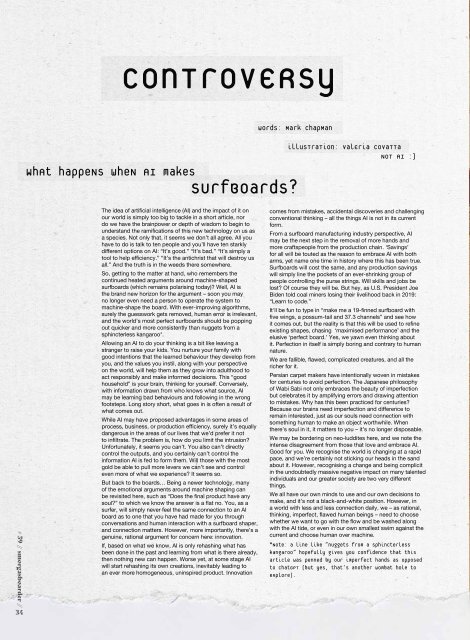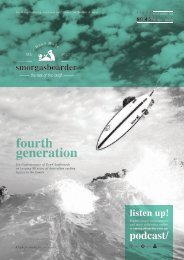SB-issue59_digital
You also want an ePaper? Increase the reach of your titles
YUMPU automatically turns print PDFs into web optimized ePapers that Google loves.
conTrOvERSy<br />
WhAt happeNs wheN AI makes<br />
words: Mark chapMan<br />
sUrfBoards?<br />
illusTraTion: valEria covaTTa<br />
NOT AI :)<br />
# 59 // smorgasboarder //<br />
34<br />
The idea of artificial intelligence (AI) and the impact of it on<br />
our world is simply too big to tackle in a short article, nor<br />
do we have the brainpower or depth of wisdom to begin to<br />
understand the ramifications of this new technology on us as<br />
a species. Not only that, it seems we don’t all agree. All you<br />
have to do is talk to ten people and you’ll have ten starkly<br />
different options on AI: “It’s good.” “It’s bad.” “It’s simply a<br />
tool to help efficiency.” “It’s the antichrist that will destroy us<br />
all.” And the truth is in the weeds there somewhere.<br />
So, getting to the matter at hand, who remembers the<br />
continued heated arguments around machine-shaped<br />
surfboards (which remains polarising today)? Well, AI is<br />
the brand new horizon for the argument – soon you may<br />
no longer even need a person to operate the system to<br />
machine-shape the board. With ever-improving algorithms,<br />
surely the guesswork gets removed, human error is irrelevant,<br />
and the world’s most perfect surfboards should be popping<br />
out quicker and more consistently than nuggets from a<br />
sphincterless kangaroo*.<br />
Allowing an AI to do your thinking is a bit like leaving a<br />
stranger to raise your kids. You nurture your family with<br />
good intentions that the learned behaviour they develop from<br />
you, and the values you instil, along with your perspective<br />
on the world, will help them as they grow into adulthood to<br />
act responsibly and make informed decisions. This “good<br />
household” is your brain, thinking for yourself. Conversely,<br />
with information drawn from who knows what source, AI<br />
may be learning bad behaviours and following in the wrong<br />
footsteps. Long story short, what goes in is often a result of<br />
what comes out.<br />
While AI may have proposed advantages in some areas of<br />
process, business, or production efficiency, surely it’s equally<br />
dangerous in the areas of our lives that we’d prefer it not<br />
to infiltrate. The problem is, how do you limit the intrusion?<br />
Unfortunately, it seems you can’t. You also can’t directly<br />
control the outputs, and you certainly can’t control the<br />
information AI is fed to form them. Will those with the most<br />
gold be able to pull more levers we can’t see and control<br />
even more of what we experience? It seems so.<br />
But back to the boards… Being a newer technology, many<br />
of the emotional arguments around machine shaping can<br />
be revisited here, such as “Does the final product have any<br />
soul?” to which we know the answer is a flat no. You, as a<br />
surfer, will simply never feel the same connection to an AI<br />
board as to one that you have had made for you through<br />
conversations and human interaction with a surfboard shaper,<br />
and connection matters. However, more importantly, there’s a<br />
genuine, rational argument for concern here: innovation.<br />
If, based on what we know, AI is only rehashing what has<br />
been done in the past and learning from what is there already,<br />
then nothing new can happen. Worse yet, at some stage AI<br />
will start rehashing its own creations, inevitably leading to<br />
an ever more homogeneous, uninspired product. Innovation<br />
comes from mistakes, accidental discoveries and challenging<br />
conventional thinking – all the things AI is not in its current<br />
form.<br />
From a surfboard manufacturing industry perspective, AI<br />
may be the next step in the removal of more hands and<br />
more craftspeople from the production chain. ‘Savings’<br />
for all will be touted as the reason to embrace AI with both<br />
arms, yet name one time in history where this has been true.<br />
Surfboards will cost the same, and any production savings<br />
will simply line the pockets of an ever-shrinking group of<br />
people controlling the purse strings. Will skills and jobs be<br />
lost? Of course they will be. But hey, as U.S. President Joe<br />
Biden told coal miners losing their livelihood back in 2019:<br />
“Learn to code.”<br />
It'll be fun to type in “make me a 19-finned surfboard with<br />
five wings, a possum-tail and 37.3 channels” and see how<br />
it comes out, but the reality is that this will be used to refine<br />
existing shapes, chasing ‘maximised performance’ and the<br />
elusive ‘perfect board.’ Yes, we yawn even thinking about<br />
it. Perfection in itself is simply boring and contrary to human<br />
nature.<br />
We are fallible, flawed, complicated creatures, and all the<br />
richer for it.<br />
Persian carpet makers have intentionally woven in mistakes<br />
for centuries to avoid perfection. The Japanese philosophy<br />
of Wabi Sabi not only embraces the beauty of imperfection<br />
but celebrates it by amplifying errors and drawing attention<br />
to mistakes. Why has this been practiced for centuries?<br />
Because our brains need imperfection and difference to<br />
remain interested, just as our souls need connection with<br />
something human to make an object worthwhile. When<br />
there’s soul in it, it matters to you – it’s no longer disposable.<br />
We may be bordering on neo-luddites here, and we note the<br />
intense disagreement from those that love and embrace AI.<br />
Good for you. We recognise the world is changing at a rapid<br />
pace, and we’re certainly not sticking our heads in the sand<br />
about it. However, recognising a change and being complicit<br />
in the undoubtedly massive negative impact on many talented<br />
individuals and our greater society are two very different<br />
things.<br />
We all have our own minds to use and our own decisions to<br />
make, and it’s not a black-and-white position. However, in<br />
a world with less and less connection daily, we – as rational,<br />
thinking, imperfect, flawed human beings – need to choose<br />
whether we want to go with the flow and be washed along<br />
with the AI tide, or even in our own smallest swim against the<br />
current and choose human over machine.<br />
*Note: a line like “nuggets from a sphincterless<br />
kangaroo” hopefully gives you confidence that this<br />
article was penned by our imperfect hands as opposed<br />
to ChatGPT (but yes, that’s another wombat hole to<br />
explore).
















